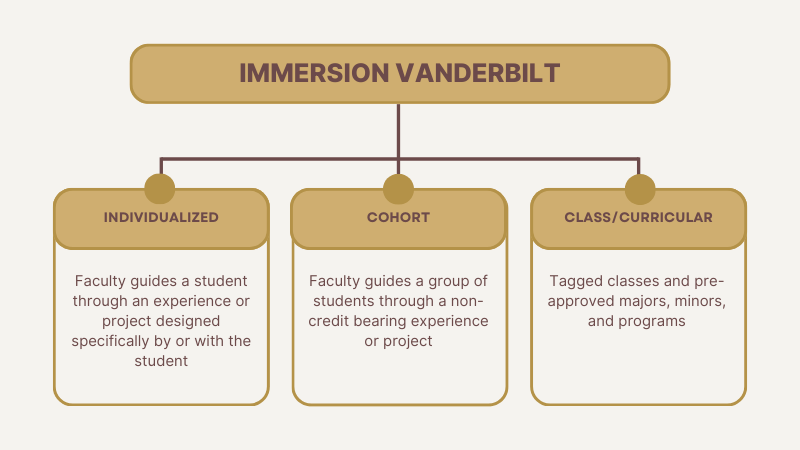What is Immersion Vanderbilt?
Immersion Vanderbilt is an undergraduate degree requirement consisting of two key parts:
Credit or non-credit bearing immersive experiences:
- Undergraduate Research
- Study Abroad
- Internships
- Community and Civic Engagement
- Leadership and Professional Development
- Innovation, Arts, and Design
Credit or non-credit bearing culminating project:
- Research paper
- Presentation (e.g., conference, research fair, Immersion showcase)
- Artwork, installation, or exhibit
- Media project (e.g., podcast, website, film, recording, etc.)
- Musical composition
- Live performance (e.g., theatre, musical, dance, etc.)
- Portfolio (can involve multiple formats and products)
- Creative writing

Role of an Immersion Vanderbilt Adviser
The faculty or staff immersive experience mentor may periodically check on the progress of their student mentee and offer opportunities for critical reflection.
The faculty adviser for the culminating project helps the student identify the project type, develop a plan for completion, and assesses the student's learning.
Advising Requirements
The faculty or staff mentor and the student determine the amount of time dedicated to advising for Immersion Vanderbilt.
Staff members interested in serving as mentors for an immersive experience should contact the Immersion Vanderbilt to learn more.
Providing Immersive Opportunities
Providing opportunities for on-campus engagement helps you to connect with students who may be interested in joining your project or research.
Tracking Students' Progress
Students can track their immersive experiences by submitting Independent Experience forms, enrolling in and completing tagged classes, and participating in immersive cohorts led by faculty or staff at Vanderbilt.
Undergraduate Class Tagging
Purpose:
Class tagging highlights opportunities to complete Immersion Vanderbilt that are embedded in the curriculum.
General Guidance:
Experiential Learning provides students with hands-on, active engagement opportunities where the student learns through the acts of doing and reflection.
Culminating Projects offer students the opportunity to integrate and apply their learning to the creation of a final project.
Support:
You are invited to contact the Office of Education Design and Development for additional support or to learn more about experiential learning and culminating projects..
Pre-Approved Programs
Academic Programs:
- Departmental Honors - College of Arts and Science
- Departmental Honors - Peabody College
- HOD Capstone - Peabody College
- Student Teaching - Peabody College
- DTL Ed Studies - Peabody College
- Senior Design Project - School of Engineering
- Senior Honors Program in Musicology/Ethnomusicology - Blair School of Music
- Senior Recital - Blair School of Music
- Naval Science Leadership
- AROTC: Military Science & Leadership
Additional A&S Programs:
- African American and Diaspora Studies Majors (Senior Thesis)
- American Studies Majors (Senior Project)
- American Studies Minors (Research Methods Workshop)
- Anthropology Majors (Capstone Course)
- Art Majors (Senior Art Show)
- Requirements for the Minor in Art
- Biochemistry and Chemical Biology Majors (Advanced Laboratory Course)
- Chemistry Majors (Advanced Laboratory Course)
- Cinema and Media Arts Majors (Senior Seminar Project)
- Economics and History Interdisciplinary Majors (Capstone Course)
- Minor in Environmental and Sustainability Studies (Capstone Course)
- Gender and Sexuality Studies Majors and Minors (Senior Seminar)
- History Majors (Capstone Course)
- Latino and Latina Studies Majors (Capstone Course)
- Law, History and Society Majors (Capstone Course)
- Neuroscience Majors (Research Courses
School & College Faculty Contacts
Each school and college has a designated faculty contact for Immersion Vanderbilt.
Explore the School & College Faculty Contact page.
To receive access to all information for advisers on the Adviser Resource page, please contact Immersion Vanderbilt.
